Darts might have its origins as a British pub game, but at 16, losing PDC World Darts Championship finalist Luke Littler is still too young to legally buy an alcoholic drink.
The teenage debutant’s run to Wednesday’s all-English showpiece match at London’s Alexandra Palace, where he lost 7-4 to world No. 1 Luke Humphries after having a dart to lead 5-2, earned him a runners-up check for £200,000 (US$254,160) just months after his high-school exams.
Premier League soccer players were among the sports fans captivated by the story of Littler, who before his opening match at the event two weeks ago was ranked 164th in the world, but now boasts close to 500,000 Instagram followers and 100,000 on X.
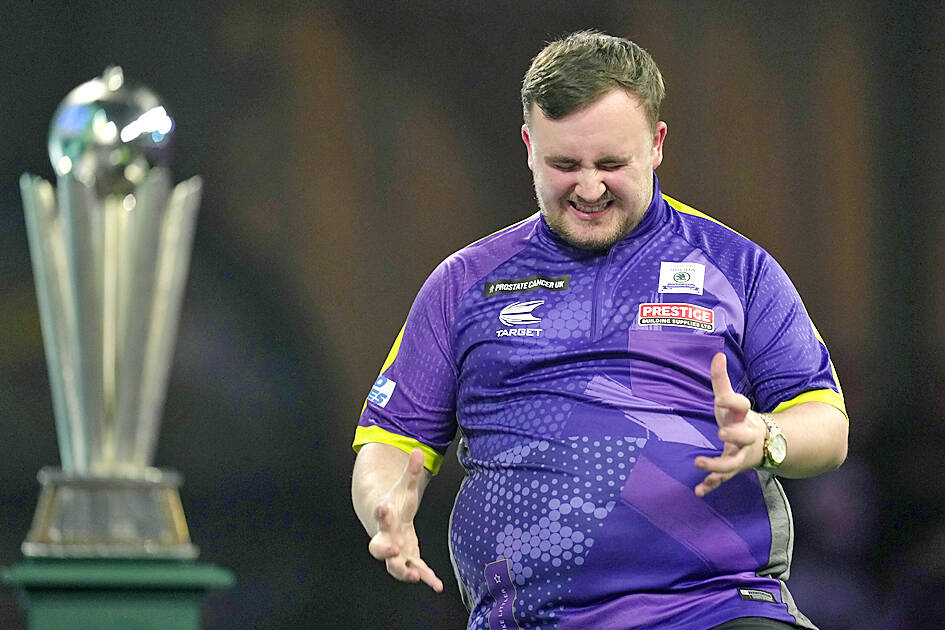
Photo: AP
“I’ve had a message off Luke Shaw of Manchester United, Rio Ferdinand and I had a message off Gary Neville and Jonny Evans ... so it’s just crazy,” said Littler, whose home in Warrington, England, is about 30km from Old Trafford, before the final.
Littler’s road to becoming darts’ youngest world finalist included a 4-1 hammering of five-time world champion Raymond van Barneveld, his childhood hero, and helped the sport generate television audiences in the millions.
He defeated 2018 champion Rob Cross 6-2 in the semi-finals.
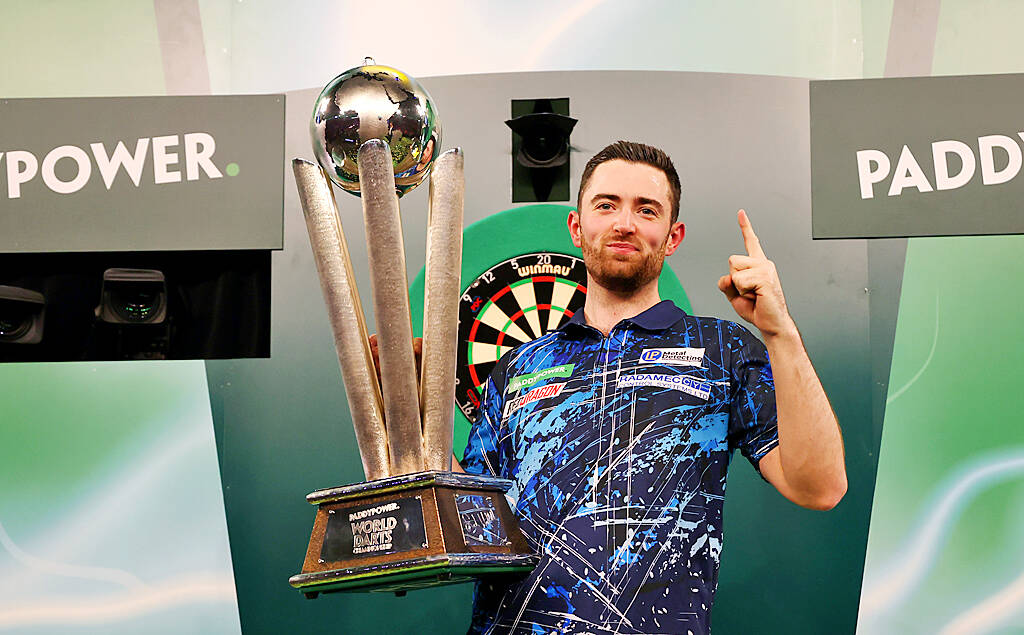
Photo: EPA-EFE
To its supporters, darts is a game of fine motor skills allied to mathematical knowledge, made all the harder at professional level by the players being cheered on by raucous and often alcohol-fueled crowds.
Players try to hit specific small targets while standing 2.37m from the board, on which the most valuable “treble” sections are also the smallest.
The aim is to go from 501 to exactly zero in the fewest number of darts while finishing either on a double on the outer edge of the board or the central bullseye.
Each player takes turns to throw three darts, with the highest total possible 180 — three treble 20s.
Littler, nicknamed “Luke the Nuke,” hit 16 180s against Cross.
Promoter Barry Hearn, a key behind-the-scenes figure in snooker’s rise to UK television popularity in the 1980s, has labelled darts “the working man’s golf.”
However, there are those who question whether the lack of athletic activity involved means darts can truly call itself a sport, with Littler’s pre-match routine at the World Championships unlikely to appease the skeptics.
“I don’t wake up until 12, in the morning go for my ham and cheese omelette, come here and have my pizza, and then go on the practice board,” said Littler, also known for celebrating his victories with a post-match kebab.
This year’s World Championship was still the subject of a feature in The Economist, a magazine known for its political analysis, on what it said was darts’ “debauched collision of fancy dress [the fans] and elite sport.”
After the final, British Prime Minister Rishi Sunak wrote on X: “Congratulations Luke, a great win tonight. What an incredible final to end a historic championship.”
However, Littler is no overnight success story, having first played as a small boy and attending the St Helens Darts Academy from the age of nine.
“When he first came as a kid you could see he was very special and he just got better and better,” academy cofounder Karl Holden said before the final. “He hardly lost so we said: ‘What do we now?’ We put him into the elite group, which is our best players, and he had just turned 10.”
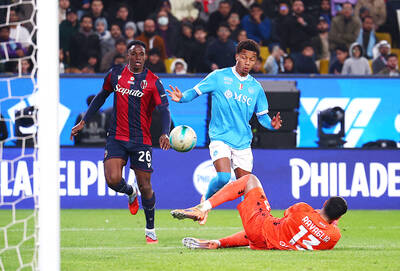
TOOTHLESS: Bologna never looked like finding a way back, and Antonio Conte and his substitutes were waiting to celebrate long before the final whistle SSC Napoli on Monday lifted the Italian Supercoppa with a 2-0 win over Bologna in Riyadh, David Neres netting both goals to earn the league champions a deserved victory over the toothless Coppa Italia winners. Neres opened the scoring with a stunning strike from distance six minutes before halftime and found the net again in the 57th minute when Bologna were caught trying to play out of defense. “We came here as champions of Italy, we wanted this trophy and we showed it with a great performance,” Napoli forward Matteo Politano told Mediaset. “We could have scored a few more goals, but
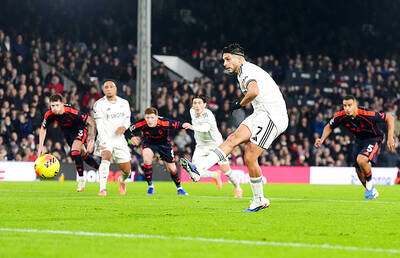
Fulham on Monday climbed away from the English Premier League relegation zone and left Nottingham Forest mired in the fight for survival after Raul Jimenez’s penalty sealed a 1-0 win. Marco Silva’s side started the day just two points above fourth-bottom Forest, but Jimenez’s first-half goal at Craven Cottage moved them 10 points clear of the bottom three. While Fulham’s relegation fears were eased heading into the Christmas schedule, Forest are just five points ahead of third-bottom West Ham United in the scrap to avoid crashing into the Championship. Forest had won six of their previous eight games in all competitions, with a
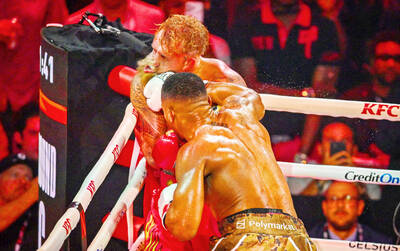
LACKLUSTER FIGHT: At one stage, the referee lost patience with the two fighters, warning them in the fourth round that ‘the fans did not pay to see this crap’ Former world heavyweight champion Anthony Joshua on Friday knocked out YouTuber-turned-boxer Jake Paul in their controversial Netflix-backed bout in Miami. The fight at the Kaseya Center, which saw both men reportedly splitting a mammoth purse of US$184 million, had triggered alarm across boxing due to the gulf in physical size and class between Britain’s two-time former world champion Joshua and Paul, an Internet personality who has forged a lucrative career through a handful of novelty boxing contests. However, in the event, Joshua made hard work of defeating his vastly less accomplished opponent, before his superior size and power eventually told

English Premier League pair Mohamed Salah and Lyle Foster were match-winners on Monday as Egypt and South Africa began their Africa Cup of Nations Group B campaigns with victories in Morocco. Liverpool star Salah struck in the first minute of stoppage-time to snatch a 2-1 win for record seven-time champions Egypt over gallant Zimbabwe in Agadir. Earlier, second-half dominance by one-time title-holders South Africa paid off when Burnley striker Foster netted on 79 minutes to deliver a 2-1 victory over Angola in Marrakesh. The stage is now set for a top-of-the-table showdown between the Pharaohs and Bafana Bafana in Agadir on Friday. They